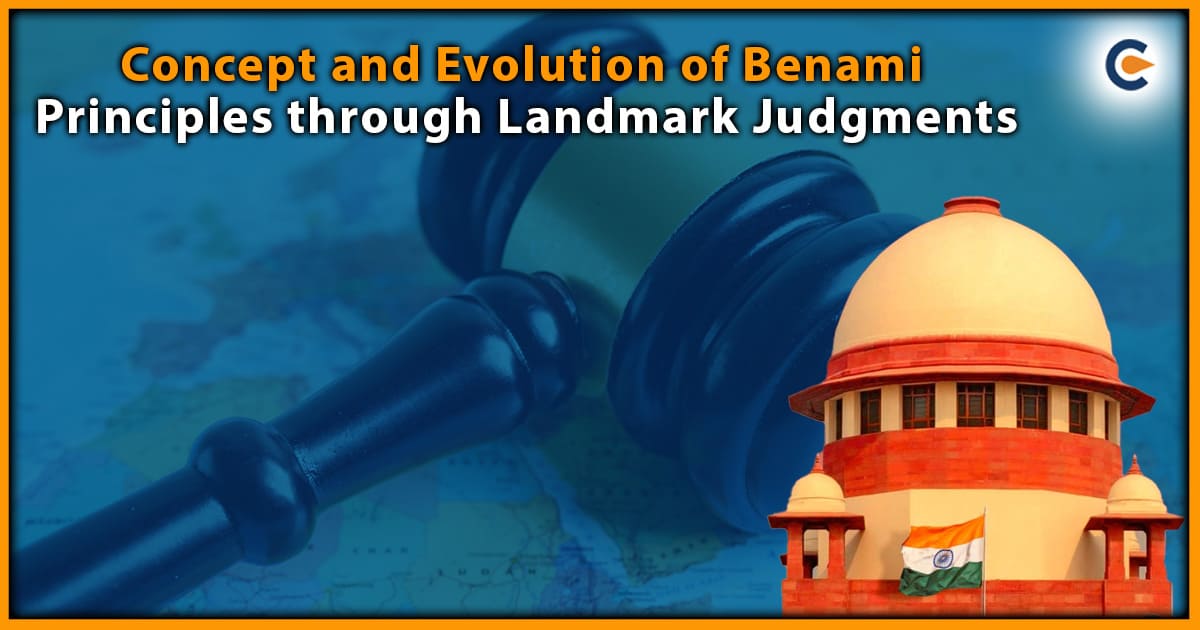The concept of Benami, which translates to “without a name” in Hindi, has been an integral part of India’s legal system for several decades. The Benami Transactions (Prohibition) Act, 1988[1], was enacted to prohibit benami transactions and provide mechanisms for their investigation and confiscation. Over the years, the concept of Benami has evolved through landmark judgments that have shaped and clarified its principles. In this blog, we will explore the concept of Benami, its evolution, and the key landmark judgments that have influenced its interpretation.
Benami Transaction
A benami transaction refers to a situation in which a property is held by one person (known as the benamidar or nominee) on behalf of another person (known as the beneficial owner) who provides the consideration for the property. In simpler terms, it is a transaction in which the real owner of the property is different from the person in whose name the property stands legally.
The term “benami” is derived from the Hindi word “benam,” meaning “without a name.” Benami transactions are typically characterized by the intention to conceal the true ownership of the property. The beneficial owner retains the rights, benefits, and control over the property, even though it is legally registered in the name of the benamidar.
Benami transactions are commonly used for various purposes, including tax evasion, money laundering, hiding assets, and concealing the proceeds of illegal activities. By holding the property in another person’s name, the beneficial owner aims to avoid scrutiny and legal obligations that come with property ownership.
To combat such transactions and promote transparency in property dealings, many countries have enacted legislation to prohibit and regulate benami transactions. These laws often provide mechanisms to investigate, confiscate, and penalize those involved in such transactions.
It is important to note that not all transactions involving a nominee or an agent are considered benami. Legitimate transactions, such as those involving trustees, nominees in fiduciary capacities, or joint ownership with legitimate contributions, are excluded from the purview of benami transactions.
Overall, benami transactions are considered illegal in many jurisdictions and are subject to legal scrutiny to ensure the true ownership of properties and prevent illicit activities such as tax evasion and money laundering.
Concept and principles of Benami Transaction
Benami principles refers to the legal framework and principles governing benami transactions. A benami transaction occurs when a property is held by one person (the benamidar), but the consideration for the property is provided by another person (the beneficial owner). The term “benami” itself translates to “without a name” in Hindi, indicating the attempt to conceal the true ownership of the property.
Principles underlying benami transaction
The principles underlying benami transactions revolve around the concepts of ownership, intention, and prohibition. These principles help establish the framework for identifying and addressing benami transactions. Here are the key principles underlying benami transactions:
- Beneficial Ownership: The concept of beneficial ownership is central to benami transactions. It refers to the person who enjoys the benefits, rights, and control over a property, even if the legal title is held by someone else (the benamidar). Identifying the beneficial owner is crucial in determining the benami nature of a transaction.
- Intent and Consideration: Benami transactions require the intention of the benamidar to hold the property on behalf of the beneficial owner. The consideration for the property, such as the payment or contribution made for its acquisition, is provided by the beneficial owner. The intent to create a benami transaction and the flow of consideration are important elements in establishing the benami nature of a transaction.
- Prohibition: Benami transactions are generally prohibited by law in many jurisdictions. They are considered illegal or void, aiming to prevent the misuse of property laws and maintain transparency in property ownership. Prohibition serves as a deterrent to individuals attempting to evade taxes, launder money, or engage in fraudulent practices.
- Investigation and Confiscation: To address the prevalence of benami transactions, legal frameworks often provide mechanisms for investigating and confiscating benami properties. These mechanisms empower authorities to identify and take action against those involved in benami transactions, including initiating inquiries, seizing properties, and prosecuting offenders.
- Burden of Proof: Establishing a transaction as benami requires the burden of proof. The burden typically lies on the person alleging the transaction to be benami, who must present sufficient evidence to support their claim. This requirement ensures that the legal process is fair and based on concrete evidence, promoting transparency and accountability.
- Prevention of Misuse: The principles underlying benami transactions aim to prevent the misuse of property and financial systems for unlawful activities such as tax evasion, money laundering, and corruption. By prohibiting and regulating benami transactions, the legal framework seeks to safeguard the integrity of property ownership and promote legitimate and transparent dealings.
Understanding the principles underlying benami transactions is essential in effectively addressing and combating the misuse of property laws and ensuring fairness, transparency, and accountability in property transactions.
The Benami Transactions (Prohibition) Act, 1988
The Benami Transactions (Prohibition) Act, 1988 is an important legislation enacted in India to prohibit benami transactions and provide a legal framework to deal with such transactions. The Act defines and regulates benami transactions, establishes authorities for investigation and adjudication, and prescribes penalties for violations. Here are the key features and provisions of the Benami Transactions (Prohibition) Act, 1988:
- Prohibition of Benami Transactions: The Act prohibits benami transactions and declares them illegal. It states that any transaction involving benami property shall be void, and the beneficial owner shall be treated as the real owner of the property.
- Definitions: The Act provides definitions for various terms related to benami transactions, including benami transaction, benamidar, beneficial owner, property, and transaction.
- Authorities under the Act: The Act establishes several authorities to enforce the provisions and investigate benami transactions. These authorities include Initiating Officer, Approving Authority, Adjudicating Authority, and Administrator.
- Initiating Officer: The Initiating Officer is responsible for initiating inquiries and proceedings in relation to benami transactions. They have the power to issue notices, gather information, and conduct investigations.
- Approving Authority: The Approving Authority is responsible for approving the initiation of proceedings by the Initiating Officer. They review the materials and evidence gathered during the inquiry and decide whether to proceed with further action.
- Adjudicating Authority: The Adjudicating Authority is responsible for adjudicating and determining the nature of benami properties. They have the power to pass orders, impose penalties, and confiscate benami properties.
- Confiscation of Benami Properties: The Act empowers the Adjudicating Authority to order the confiscation of benami properties. Confiscated properties are held by the Administrator appointed under the Act.
- Penalties and Prosecution: The Act prescribes penalties for various offenses related to benami transactions. These include imprisonment, fines, and confiscation of properties. It also provides for the prosecution of individuals involved in benami transactions.
- Appellate Tribunal: The Act establishes an Appellate Tribunal to hear appeals against the orders of the Adjudicating Authority. The Tribunal provides a mechanism for aggrieved parties to challenge decisions and seek redressal.
- Protection for Whistleblowers: The Act provides protection to whistleblowers who provide information about benami transactions. It prohibits victimization or harassment of individuals who report benami transactions in good faith.
The Benami Transactions (Prohibition) Act, 1988 aims to curb the prevalence of benami transactions, promote transparency in property dealings, and prevent the misuse of property laws. It provides a legal framework to investigate, adjudicate, and confiscate benami properties, ensuring accountability and deterrence against illicit activities. The Act has undergone subsequent amendments to strengthen its provisions and enhance its effectiveness in combating benami transactions.
Landmark Judgments
The evolution of benami principles through landmark judgments in India has been instrumental in shaping and refining the legal framework surrounding benami transactions. Several key judgments have played a significant role in clarifying the concepts, establishing principles, and providing guidance for the identification and treatment of benami transactions. Here are some landmark judgments that have contributed to the evolution of benami principles in India:
Jaydayal Poddar v. Bibi Hazra (1974) – India
This is one of the famous landmark judgments, the Supreme Court of India established the foundation for understanding benami principles. It defined the three essential elements of a benami transaction: (a) transfer of property to one person, (b) consideration provided by another person, and (c) intention to hold the property for the benefit of the person providing the consideration. This judgment laid down the groundwork for identifying and establishing benami transactions.
Bhim Singhji v. Kan Singhji (1981) – India
The Supreme Court of India, in this significant judgment, held that benami transactions are not recognized by law. It emphasized that the true owner has the right to recover the property from the benamidar. This judgment highlighted the importance of preventing the misuse of property laws and protecting the rights of the actual owners.
Binod Kumar v. State of Bihar (2017) – India
In this case, the Supreme Court of India expanded the interpretation of the Benami Transactions (Prohibition) Act, 1988. The Court held that the Act should be interpreted broadly to include not only direct benami transactions but also those made through intermediaries or fictitious names. This judgment broadened the scope of the legislation and provided a more comprehensive framework to tackle various forms of benami transactions.
Veluguri Kotayya v. Veeramachaneni Seetha Devi (2018) – India
The Andhra Pradesh High Court, in this judgment, clarified the principle of burden of proof in benami transactions. It held that the burden lies on the person alleging a transaction to be benami, who must provide substantial evidence to establish its benami nature. This judgment emphasized the need for concrete evidence and due process in determining the benami nature of transactions.
Law Society of Zimbabwe v. Chawona (2014) – Zimbabwe
In this landmark judgment, the Supreme Court of Zimbabwe provided insights into benami principles. It emphasized the importance of intent in determining benami transactions, stating that the intention to hold the property for the benefit of another person is a crucial factor. This judgment contributed to clarifying the principles and factors to be considered in identifying benami transactions in Zimbabwe.
H. Venkatachala Iyengar v. B.N. Thimmajamma (1986)
This case clarified that in a benami transaction, the true ownership rests with the person providing the consideration, even if the property is held in the name of another person.
Laxmi Chand v. Laxmi Narain (1976)
This judgment emphasized that a benami transaction can be proved through direct or circumstantial evidence, and the intention of the parties is the key factor in determining the true nature of the transaction.
Pooran Mal v. Director of Inspection (1974)
The Supreme Court in this case highlighted that the benami character of a transaction can be established based on the surrounding circumstances, intention of the parties, and the nature of possession and enjoyment of the property.
T. Bhattachargee v. Dasarath Deb (1961)
In this case, the Supreme Court of India recognized the concept of benami transactions and emphasized that the true test to determine whether a transaction is benami is the intention of the parties involved.
Conclusion
Through landmark judgments, the evolution of benami principles has taken place, shaping and refining the legal framework surrounding benami transactions. These judgments have provided clarity on the essential elements of benami transactions, emphasized the burden of proof, expanded the interpretation of legislation, and highlighted the significance of intent. The evolution of benami principles through landmark judgments reflects the commitment of the judiciary to address the challenges posed by such transactions and ensure transparency, accountability, and fairness in property ownership and transactions.
Read Our Article: Benefits Of Property Registration











